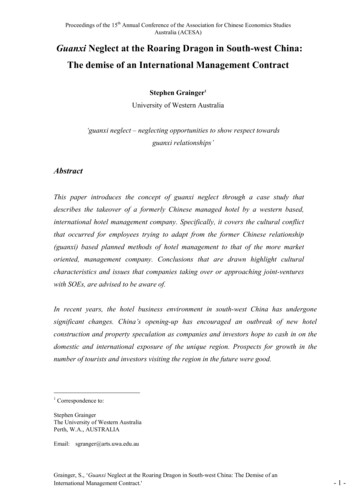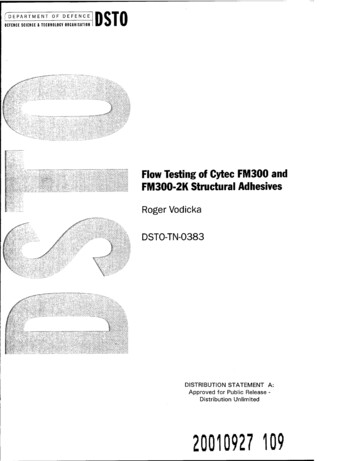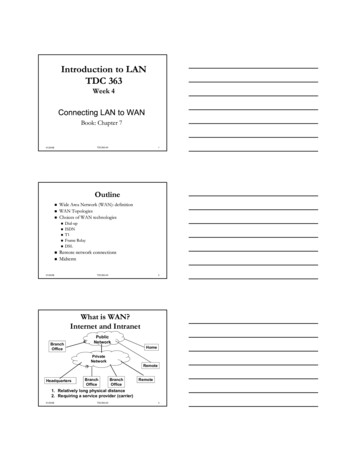
Transcription
Proceedings of the 15th Annual Conference of the Association for Chinese Economics StudiesAustralia (ACESA)Guanxi Neglect at the Roaring Dragon in South-west China:The demise of an International Management ContractStephen Grainger1University of Western Australia‘guanxi neglect – neglecting opportunities to show respect towardsguanxi relationships’AbstractThis paper introduces the concept of guanxi neglect through a case study thatdescribes the takeover of a formerly Chinese managed hotel by a western based,international hotel management company. Specifically, it covers the cultural conflictthat occurred for employees trying to adapt from the former Chinese relationship(guanxi) based planned methods of hotel management to that of the more marketoriented, management company. Conclusions that are drawn highlight culturalcharacteristics and issues that companies taking over or approaching joint-ventureswith SOEs, are advised to be aware of.In recent years, the hotel business environment in south-west China has undergonesignificant changes. China’s opening-up has encouraged an outbreak of new hotelconstruction and property speculation as companies and investors hope to cash in on thedomestic and international exposure of the unique region. Prospects for growth in thenumber of tourists and investors visiting the region in the future were good.1Correspondence to:Stephen GraingerThe University of Western AustraliaPerth, W.A., AUSTRALIAEmail: sgranger@arts.uwa.edu.auGrainger, S., ‘Guanxi Neglect at the Roaring Dragon in South-west China: The Demise of anInternational Management Contract.'-1-
Proceedings of the 15th Annual Conference of the Association for Chinese Economics StudiesAustralia (ACESA)The Roaring Dragon Hotel, was a famous 40 year old-Chinese SOE. In the second half of1999 an international management company set about transforming the culture within thehotel from a Chinese hotel that was relationship based environment to a modern marketoriented organisation. Following story describes the experience during the transition froma planned to market economy.MethodologyFrom May to December 1999, June to July, 2001, and November to December 2002,research into the modus operandi of guanxi was carried out at a four-star hotel (referred tohere as the Roaring Dragon Hotel) in south-west China. The hotel employed more than 670people.Interviews were recorded with 35 middle and senior managers from the hotel and a groupof 11 officials, academics, and businessmen from this environment. 15 participants wereinterviewed on more than one occasion across the three research periods. Un-attributed,direct quotes used throughout this manuscript are taken from verbal transcripts of theseinterviewees.In addition, a 65-item written survey was conducted with hotel staff the week before thetakeover and again three months after the takeover. 439 completed the first survey and 144the second. Some findings from this survey are acknowledged in the following.The Roaring Dragon HotelThe Red Dragon2 Hotel had been the first four star hotel in the city and since the early1960s had enjoyed a reputation as the most famous accommodation-provider in theregion. Being a state owned enterprise (SOE) with a long and colourful history, it was2The names of all people and places have been changed to protect the research sources.Grainger, S., ‘Guanxi Neglect at the Roaring Dragon in South-west China: The Demise of anInternational Management Contract.'-2-
Proceedings of the 15th Annual Conference of the Association for Chinese Economics StudiesAustralia (ACESA)the region’s premium guesthouse for visiting government officials, dignitaries andguests.To staff the Hotel at its commencement, employees had been transferred in from otherSOE or government departments primarily on the strength of their guanxi orconnections. Having gained a position from the opening of the Hotel, Roaring Dragonemployees felt ‘excited’ and ‘very proud’. Some recalled ‘if your relatives or yourfriends knew that you were working in Roaring Dragon, you would be admired’, ‘itwas a good work unit - danwei’, and ‘you were lucky if you worked there’3.The original Hotel was a four-storey, rectangular, grey structure built in 1960 in a dullRussian style. By 1993, the provincial government had funded a new extension andthe Hotel now consisted of two parts: the old four-storey section joined by a modernsixteen-storey extension perched on a hill behind the old Russian. There was acontrast in the standard of accommodation. Room rates were cheaper in the oldsection and so it attracted Chinese visitors searching for quality economyaccommodation. Visiting government officials and higher-end customers on the otherhand felt more comfortable in the newer and naturally more expensive section. Therewere two guarded entrances to the Hotel, one on each level. A series of stairways,elevators and a warren of banquet rooms, hallways, storage areas, offices, cafeterias,and a laundry untidily connected the two buildings.Reflection on a 1993 ExperienceThe Roaring Dragon was a Chinese managed SOE until the opening of the newextension in 1993 when the provincial government decided to contract aninternational company to manage the Hotel with the objective of improving thequality of customer service. KYZ Corporation was identified as a suitableinternational management organisation and was contracted to manage the Hotel. Theirrepresentative, Mr. Meyer, a Mandarin-speaking German, became the Hotel’s new3These quotations are taken directly from the 35 interviews with Red Dragon Hotel employees.Grainger, S., ‘Guanxi Neglect at the Roaring Dragon in South-west China: The Demise of anInternational Management Contract.'-3-
Proceedings of the 15th Annual Conference of the Association for Chinese Economics StudiesAustralia (ACESA)General Manager (GM) with the former Chinese GM, Mr. Wen, becoming second-incommand.After a short time under the new management, Wen began complaining that he hadlost his privileges. He could ‘no longer enjoy practices such as inviting someone tothe Hotel for a complimentary dinner or reap other benefits without first gainingapproval from Meyer the KYZ GM. For Wen and his former management staff, thechange of management was an issue of great concern as most of the privileges theyhad previously enjoyed had been discontinued. This loss of benefits resulted in theChinese managers’ being reluctant to embrace new management practices as ‘in theirhearts the Chinese employees did not want to be managed by Meyer or the KYZCorporation’. In terms of incentive or financial reward, there were few, if any, reasonsfor the Chinese employees to make the new arrangement work. ‘Employee salarieshad not changed’ and ‘the foreign management did not know the Chinese way’.From the time KYZ took over the management of the Hotel, business graduallydeclined. After three months, occupancy was very low’ and the recently openedextension was only in operation above the seventh floor. Finally, after a year of poorperformance, the Chinese provincial government told KYZ that they were notperforming well and that they wanted to end the contract. KYZ did not receive thisnotification well and commenced proceedings to claim damages in the courts from theprovincial government breaking the contract. The provincial government had guanxiwith the local judges and was confident the damages would be minimal. After a yearof apparent non-cooperation and turmoil, the KYZ management left in November1994 and Wen, the former Chinese GM resumed control.With Wen’s reinstatement came the resumption of the former organisational cultureincluding the practices of nepotism and favouritism. Guanxi cliques in the Hotelresumed operation and the re-establishment of relationships with the local touristagents resulted in the occupancy levels returning to their former levels.Grainger, S., ‘Guanxi Neglect at the Roaring Dragon in South-west China: The Demise of anInternational Management Contract.'-4-
Proceedings of the 15th Annual Conference of the Association for Chinese Economics StudiesAustralia (ACESA)The Roaring Dragon Hotel was eventually required to fund the resulting lawsuitcompensation to KYZ. To Wen and the employees it did not matter as ‘the provincialgovernment would pay the damages’.The 1998 StoryBy 1998, the provincial government had again become dissatisfied that the potentialof the Hotel was not being realised, especially as the Roaring Dragon was situated ina famous tourist location. Since the Chinese management’s resumption of control in1994, the financial performance was still well below its potential. At times, the Hotelwas losing money and the provincial government ‘was not happy with the way it wasbeing managed’.Under Wen, management practices remained outdated and ‘the staff were notdeveloping or expanding the Hotel business’. Among the employees, there was anatmosphere of little concern as their salaries, although ordinary, were secure and theywere content in the knowledge that the provincial government would cover any of theHotel’s losses. The Hotel danwei was highly ranked4 which meant that the workingconditions and benefits were good when compared with those of the rest of thepopulation (Walder, 1986). The ‘580 yuan per month paid to a barman’ or the ‘1500yuan per month paid to a manager’, combined with the easy work, neat and tidyuniforms, complimentary meals, accommodation and fringe benefits made the Hotelan attractive and respectable place of work.The organisational culture was very relaxed with many employees finding time toread newspapers and enjoy a green tea during working hours. For some managers,conducting private business was easy and from time to time they could be seenleaving the premises for a few hours to attend to ‘other business’. One example wasthe Hotel’s Head of Training who had a restaurant just a few blocks away. In theafternoons, he would make regular visits to ensure operations and supplies at hisGrainger, S., ‘Guanxi Neglect at the Roaring Dragon in South-west China: The Demise of anInternational Management Contract.'-5-
Proceedings of the 15th Annual Conference of the Association for Chinese Economics StudiesAustralia (ACESA)restaurant were flowing smoothly. It was easy as the Hotel was overstaffed, jobs weresecure, and besides no Chinese manager wanted to be responsible for firingpotentially well connected, lazy or unproductive employees.As Rofel (1999: 108) identified, this type of SOE, as having work cultures that stilloperated largely under the shadow of the Cultural Revolution and carried employeeswho ‘did not have commitment’ or a ‘sincere working attitude’. The Roaring DragonHotel employees did not want to work hard and were not concerned about the Hotel’ssteady decline in popularity and income. China’s new market economy demanded thatorganisations become profitable, yet the Roaring Dragon’s Chinese managementshowed little concerns for generating profit and basically did not comply. During thesame period, competition arrived as new hotels opened their doors and as thiscompetition grew, the financial fortunes of the Roaring Dragon Hotel declined evenfurther.As a result, in 1998 the provincial government was again tempted to contract aninternational management company to arrest the declining fortunes of the RoaringDragon. They identified Nothill as an organisation with the right internationalreputation, credentials and brand name to take up the management contract. They feltconfident that under Nothill’s management, the Roaring Dragon Hotel’s potentialwould be realised.In March 1998, negotiations commenced with the globally respected NothillCompany to take over management of the Roaring Dragon. By mid-1998, it wasagreed in principle that Nothill would take control of the management of the RoaringDragon and, to save face, the incumbent Chinese GM, Wen, would be installed as theGM ‘of a new company, the Roaring Dragon Limited’. The role of Roaring DragonLimited would be to oversee the activities of Nothill and ‘act as a conduit throughwhich Nothill communicated with the Hotel’s Board’.4Each danwei receives a ranking from the government which determine its status in the Chinesecommunity. This status directly influences the benefits and advantages the danwei is able to gain for itsGrainger, S., ‘Guanxi Neglect at the Roaring Dragon in South-west China: The Demise of anInternational Management Contract.'-6-
Proceedings of the 15th Annual Conference of the Association for Chinese Economics StudiesAustralia (ACESA)Nothill and Harvey’s arrivalTo negotiate the finer points in the contract and help prepare the Roaring Dragon for acomplete management takeover, Nothill sent one of their Australian Managers, Mr.Harvey, to complete the negotiations and initially co-manage the Hotel with Wenfrom May 1998. It did not take Harvey long to realise that a management takeoverwould involve changes in the Roaring Dragon’s organisational culture. Entrenchedguanxi practices, the poor quality of customer service and at times significant annuallosses had to be converted into more accountable, quality service practices withemployees who were prepared to strive for excellence.Harvey’s mandate included identifying efficient and effective staff who would be ableto help develop the Nothill standard of excellence at the Hotel. He realised that thismight not be easy as many of the existing staff had been employed there for fifteenyears or more. During that time the majority of them had experienced little or notraining, and had developed only a limited understanding of the concepts of westernprofessionalism or efficiency. Harvey faced the challenge of transforming a largegroup of relaxed family-based employees, working under an ad-hoc managementstyle into a professional group of employees operating under a structured internationalcommercial culture.From the time of his arrival, Harvey ’mixed easily’ with the Chinese people andregu
The Roaring Dragon Hotel, was a famous 40 year old-Chinese SOE. In the second half of 1999 an international management company set about transforming the culture within the hotel from a Chinese hotel that was relationship based environment to a modern market oriented organisation. Following story describes the experience during the transition from a planned to market economy. Methodology From .











